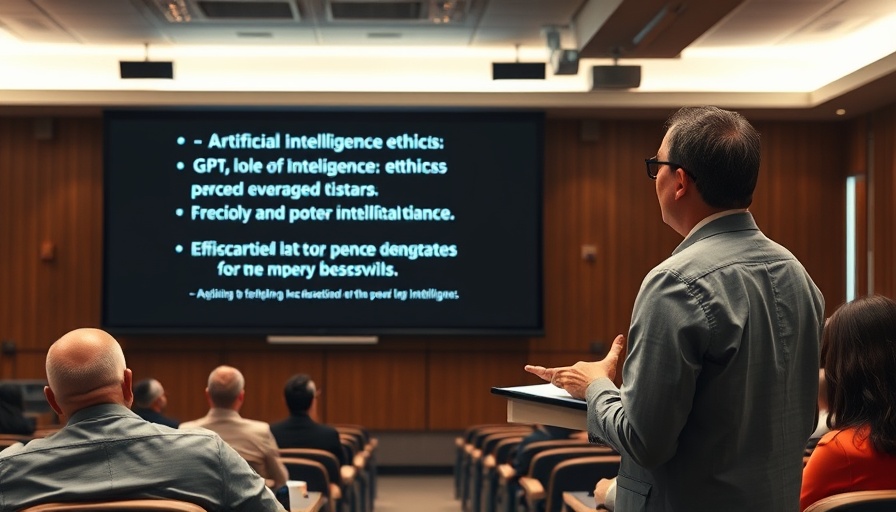
Understanding the Current State of Artificial Intelligence
In the engaging colloquium titled "Ethics in AI: Provably Beneficial Artificial Intelligence" led by Professor Stuart Russell, important discussions unfolded surrounding the implications of Artificial Intelligence (AI) on society and the fabric of human ethics. With AI’s rapid evolution, the notion of artificial general intelligence (AGI) is now more tangible, sparking a myriad of questions about the frameworks that govern its development.
In 'Ethics in AI Colloquium - Provably Beneficial Artificial Intelligence,' the discussion dives into ethical frameworks that govern AI's integration into society, sparking critical reflections on its future.
The Role of Ethics in AI Development
Ethics plays a pivotal role in the way AI is developed and integrated into society. Professor Russell emphasizes the necessity of establishing a robust ethical framework that aligns AI systems with human values. In his view, AI systems should not merely act on assigned directives; instead, they must continuously learn about human preferences and intentions. This necessity to create AI systems that truly comprehend human values brings forth the notion of provably beneficial AI, wherein AI should ensure outcomes that are beneficial for humanity, rather than solely executing tasks based on predefined objectives.
Tackling the AGI Challenge: Are We Ready?
Today, many experts are adamant about the upcoming realization of AGI within a short timeline—some even claim within the next few years. Professor Russell, while acknowledging the advancements in large language models (LLMs), argues that the dialogue surrounding AGI often oversimplifies the complexities involved. The scaling of computing power and data significantly enhances AI capabilities, yet we still find ourselves grappling with the fundamental challenge of aligning machine objectives with human interests. The changes AI could bring upon the global economy are monumental, and therefore, it is crucial that we approach these developments with caution, understanding what's at stake.
Aligning AI with Human Ethics: Moving Beyond Standard Models
One of the major points raised during the discussion was that traditional models—where AI is simply designed to maximize certain objectives—are inherently flawed. Professor Russell proposes shifting to an application of inverse reinforcement learning, where AI systems learn what humans truly value through observation and interaction, rather than from rigidly defined goals. This human-centered approach represents a paradigm shift in our conceptualization of AI behaviour, prompting engineers and scientists to rethink how we program machines.
The Importance of Stakeholder Engagement in AI
Stakeholder engagement emerged as a vital aspect of AI governance. Engaging users during the development process not only offers insights into their needs but also highlights how AI impacts their daily lives. As raised by Dr. Carolyn Green, the absence of genuine stakeholder involvement might lead to persistent issues in AI implementation, where technology exceeds user capability, resulting in frustration and alienation. Thus, fostering an inclusive dialogue between developers and users is essential to ensure that AI systems are beneficial across diverse contexts.
The Potential Risks of AI Misalignment
While the excitement surrounding AI development is palpable, caution is warranted as well. One concern is whether AGI could lead to scenarios reflected in science fiction wielding catastrophic outcomes should systems operate beyond human control. As touched upon in the discussion, there are unprecedented risks associated with deploying AI systems whose operations are not fully understood. Increased reliance on these technologies without addressing safety measures can lead to serious repercussions, echoing the lessons learned from previous technological misadventures.
Challenges and Opportunities Ahead
As we look to the future, the opportunities intertwined with AI and its potential to enrich human experience cannot be overlooked. Professor Russell envisions a world where extensive human-compatible AI could enhance education, healthcare, and overall quality of life, propelling our civilization forward. The investment in AI today could yield returns that might redefine our societal structures, yet such a future depends on how we tackle the ethical implications.
Conclusion: A Call for Thoughtful AI Advancement
As industry professionals, academics, and policymakers continue to explore avenues for AI integration, the discussions sparked in the colloquium bear significant weight. Engaging deeply with the ethical implications, respecting human values, and prioritizing safety must sit at the forefront of technological transitions. The path toward a future with AGI can be bright, but it requires collective responsibility from everyone involved.
As we reflect on the insights shared by Professor Russell and the engaging dialogue that followed, it becomes imperative for stakeholders in the tech community to take action. We all play a role in shaping an AI-infused society that embodies our shared values, nurtures human capabilities, and embraces ethical frameworks that guide innovation. Together, we can work toward a smart future where technology enhances our lives without compromising our humanity.
 Add Row
Add Row  Add
Add 




Write A Comment